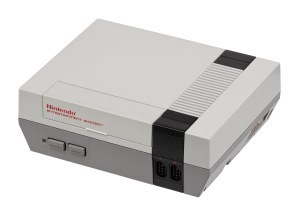Difference between revisions of "NES"
(added OSSC settings) |
(added some basic info with a view to adding OSSC settings) |
||
| Line 1: | Line 1: | ||
| + | [[File:Nes-console-300px.jpg|300px|thumb|right|Front loading Nintendo NES console as sold in Europe and USA]] | ||
| + | |||
| + | The Nintendo Entertainment System (commonly abbreviated as NES) is an 8-bit home video game console that was developed and manufactured by Nintendo. The console is known as the Family Computer or Famicom in Japan. | ||
| + | |||
| + | The console was phenomenally successful especially in Japan and the USA and was on sale in one form or another for almost twenty years. | ||
| + | |||
| + | Amongst retro-gamers, the NES is notorious for only offering composite video output. However, there are both RGB and HDMI mods now available for the console. | ||
| + | |||
== Models == | == Models == | ||
| − | + | The front loading NES as pictured above was sold in America and Europe. This model suffers from a design flaw that causes the cartridge connector to wear out and make poor contact with the game cartridge. Several solutions to this problem exist, including the "blinking light win" kits. | |
| + | |||
| + | The Famicom, as sold in Japan, looks somewhat different from this and has a top-loading cartridge slot. | ||
| + | |||
| + | Later models of the console (NES-101 and HVC-101) also feature top-loading cartridge slots. | ||
| + | |||
| + | In Japan, Nintendo also released an add-on called the Famicom Disc System. This was intended to provide a more affordable way of distributing game software. The Sharp Famicom Twin includes this add-on built in. | ||
| + | |||
| + | Various clones of the system exist too. For more information, see the [https://en.wikipedia.org/wiki/Nintendo_Entertainment_System#Hardware|Wikipedia article here.] | ||
=== Models tested === | === Models tested === | ||
Revision as of 04:06, 14 June 2017
The Nintendo Entertainment System (commonly abbreviated as NES) is an 8-bit home video game console that was developed and manufactured by Nintendo. The console is known as the Family Computer or Famicom in Japan.
The console was phenomenally successful especially in Japan and the USA and was on sale in one form or another for almost twenty years.
Amongst retro-gamers, the NES is notorious for only offering composite video output. However, there are both RGB and HDMI mods now available for the console.
Contents
Models
The front loading NES as pictured above was sold in America and Europe. This model suffers from a design flaw that causes the cartridge connector to wear out and make poor contact with the game cartridge. Several solutions to this problem exist, including the "blinking light win" kits.
The Famicom, as sold in Japan, looks somewhat different from this and has a top-loading cartridge slot.
Later models of the console (NES-101 and HVC-101) also feature top-loading cartridge slots.
In Japan, Nintendo also released an add-on called the Famicom Disc System. This was intended to provide a more affordable way of distributing game software. The Sharp Famicom Twin includes this add-on built in.
Various clones of the system exist too. For more information, see the article here.
Models tested
US Front loader with NESRGB (tested on OSSC).
XRGB-2 Specific settings
insert data
XRGB-3 Specific settings
insert data
XRGB-Mini Specific settings
insert data
OSSC Specific settings
Setting sync LPF to 33MHz may be required for best results.
